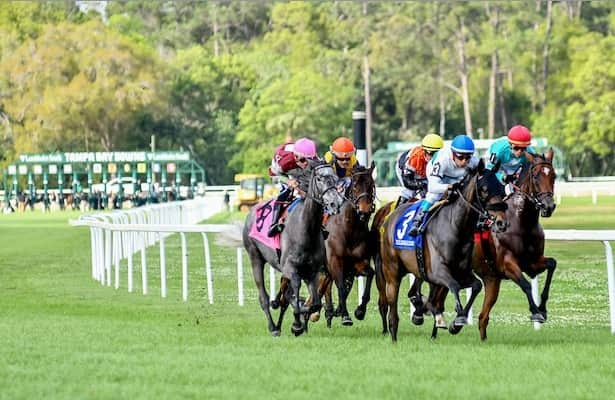UNCG dean advocates for jockey health and safety in horse racing – UNC Greensboro

Horse racing isn’t a sport for the faint of heart. Jockeys steer 1,000-pound horses around racetracks at about 40 miles per hour.
“Jockeys are some of the toughest and most impressive athletes I’ve worked with in my career,” says Dean of UNCG’s School of Health and Human Sciences Carl Mattacola.
Despite the injury-prone nature of the sport, Mattacola says jockeys and horses have historically had few consistent guidelines protecting their health. Mattacola is a member of the Horseracing Integrity and Safety Authority (HISA), a private, self-regulatory organization working to make a change for the better.
HISA has existed for about four years since the Horseracing Integrity and Safety Act of 2020 was signed into law. Their goal: create and standardize guidelines to promote the health and safety of both horses and jockeys.
As part of HISA’s Racetrack Safety Committee, Mattacola brings both applied experience as an athletic trainer, as well as research expertise in sports medicine, neuromuscular control, and concussion testing.
“It is a pleasure to serve HISA and improve sports medicine under the leadership of CEO Lisa Lazurus and Medical Director Dr. Peter Hester and advance care for professional jockeys,” Mattacola says.
Advocating for jockeys
Mattacola has been motivated to help jockeys for over a decade.
He was dismayed to discover that jockeys had less care and oversight than the high schoolers he had worked with for years as an athletic trainer. As a researcher at the University of Kentucky, Mattacola conducted some of the first epidemiological data on jockey injuries in the US.
“The challenge before HISA was that there was no national organization for horse racing,” he says. “You could be injured, have a concussion, go ride wherever you wanted the next day, and no one was going to know about it as long as it wasn’t the same track.”
While his earlier research focused on lower extremity injuries, such as ankle instability and knee injuries, Mattacola decided to pivot and tackle a peripheral topic that could help jockeys: standardized protocols for concussions.
He implemented a pilot program at the internationally recognized Keeneland Race Track where jockeys received standardized baseline testing for concussion, including a physical and neurological exam, clinical assessment for cervical spine trauma, and a balance exam.
If a jockey received an injury while riding, they had to receive medical clearance from a health provider. The pilot proved successful, expanding to multiple racetracks, with over 100 jockeys tested.
“I was one to advocate for standardized baseline assessment for concussions for jockeys,” he says. “In the athletic training profession people had been doing that at the high school and college level for years, but we were applying it in this needed space.”
Creating protocols to help horses, jockeys
Mattacola brought the findings from this pilot program to HISA’s Racetrack Safety Program.
“The majority of my work within this committee was assisting with writing the components of the accreditation that pertains to human health and safety,” he says.

Some of the committee’s guidelines include ambulances on site at racetracks, a health professional available to evaluate jockeys, and a person to document any injuries. Mattacola says these protocols help both the jockey and the horse – given that the two are connected to one another throughout the sport.
“A benefit of our work is that this standardization can help reduce both horse and human injuries,” he says. “The other distinct advantage for humans is an organized and coordinated medical care that can be more consistent between states.”
He says his work on the committee resonates with the mission of UNCG’s School of Health and Human Sciences to provide key resources related to the human health experience.
In October, Mattacola and some of his UNCG colleagues will participate in HISA’s International Jockey Concussion, Safety and Wellness Conference. Associate Professor Dr. Jeff Milroy and Professor Dr. David Wyrick who will speak about Strategies for Athlete Communications on Mental Health and Safety.
While he’s pleased with the progress, Mattacola says there’s more to do. “There is more work that needs to be done examining epidemiological, biomechanical, and nutritional factors important for jockey health, which is a strength of the faculty at UNCG HHS,” Mattacola says. “In addition, there is a greater need for mental health care.”
Story by Rachel Damiani

Transform the human experience
Related
Leading Parx jockey Sanchez will serve 7-day suspension
Photo: Jason Moran / Eclipse Sportswire Jockey Mychel Sanchez will serve a seven-day suspension and pay an additional $1,750 in fines
Bill Mott talks about plans for Sovereignty, Just F Y…
Photo: Gulfstream Park / Lauren King Sovereignty, dramatic late-running winner of the Fountain of Youth (G2) March 1, is being pointed
Up-and-coming Cavalieri chases Grade 1 glory in Beholder Mile
Photo: Santa Anita / Benoit Photo Cavalieri and Alpha Bella, who finished one-two in the Grade 3 La Cañada in January at Santa Anita,
4 stakes showcase shipping stars on Tampa Bay undercard
Photo: Gonzalo Anteliz Jr. / Eclipse Sportswire The stars will shine Saturday at Tampa Bay Downs, and not just in the Grade 3 Tampa Ba











